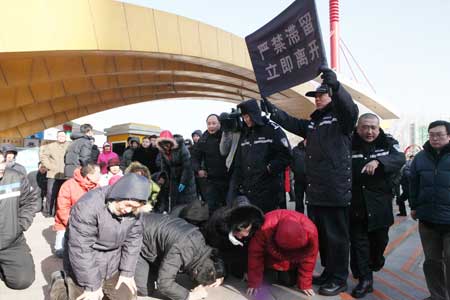Residents of former bomb shelters to be expelled
At least 100 managers of air raid shelters that have been converted into basement apartments gathered in Beijing Thursday afternoon in front of a downtown park to demand that authorities abolish a regulation that asks them to evacuate an estimated 1 million tenants from such underground spaces before January 20.
 |
|
?A policeman holds a banner saying, "Lingering prohibited. Leave immediately," as they try to disperse petitioners gathered Thursday at Beijing's Chaoyang Park. |
One hour later, the crowd was dispersed by some 20 uniformed police officers. No injuries or violence were reported.
The renting out of those spaces was ordered to stop under new regulations issued by the Ministry of Housing and Urban-Rural Development in mid-December.
The directive contradicts one from 2008 that allowed for the rental of air raid shelters turned into basements. The result was a boom in the business of basement renting among low-wage earners such as migrant workers in the city, the Beijing News reported.
Gao Yang, the 45-year-old manager of a 1,000-square-meter underground apartment area, told the Global Times that he received the evacuation notice December 17, just a month after he was issued a permit by the Beijing Municipal Bureau of Civil Defense (MBCD) to rent such underground apartments.
"I'm not only here for myself, but also for the 100 tenants in my basements. I'll lose everything, and they will become homeless," Gao said, adding that the new policy means his 400,000-yuan (US$60,560) investment will be lost.
A 30-year-old man surnamed Li, who works for a realty management company, told the Global Times that the new measures also don't consider the interests of people like him who don't make much money.
"To rent an apartment in Beijing is too expensive for me, and places in suburban areas are too far to be considered. The new regulation really leaves me with no choice but to leave Beijing," said Li, who has been in Beijing for 10 years. "Although we don't have higher education, we still make contributions to Beijing. Being forced out like this is a shame."
Zhou Xiangping, an official with the MBCD, told the Global Times Thursday that the move is not aimed at driving migrant workers out of Beijing.
"To move people out from such basement apartments is to better safeguard people's properties and lives, and restore (the areas') readiness in the event of war," Zhou said.
"The situation is complicated, and it is impossible to have a unified standard (for compensation). We haven't considered any detailed compensation measures yet," Zhou said. He declined to confirm whether authorities would offer compensation to end the dispute.
More than 6,000 basements in Beijing are used for living, accounting for 31.5 percent of the underground space in the city, according to the Legal Mirror.
Though the basements offer cheap housing of about 500 yuan ($75.70) per month, overcrowding areas and safety are the most frequently cited concerns.
The Beijing Evening News recently reported that a 120-square-meter basement in Chaoyang District was being lived in by 30 people.
"The new measures are likely to address issues such as public security and migrant management because unregulated basement renting creates problems," Wang Yukai, a professor of public administration at the Chinese School of Governance, told the Global Times.
Wang said the policy is a hasty decision without considering settlements for those low-wage earning tenants or what will happen if they become homeless.
"Policymakers need to find balance in the issue, otherwise they will create more problems before resolving one," he added.
Li Jianmin, a vice president of the China Population Association, said forcing renters out in this way is careless.
"Some may be forced to leave the city, while others who stay in Beijing are likely to be subject to higher living and transport costs, which will in turn raise labor costs," he said.
 0
0 






